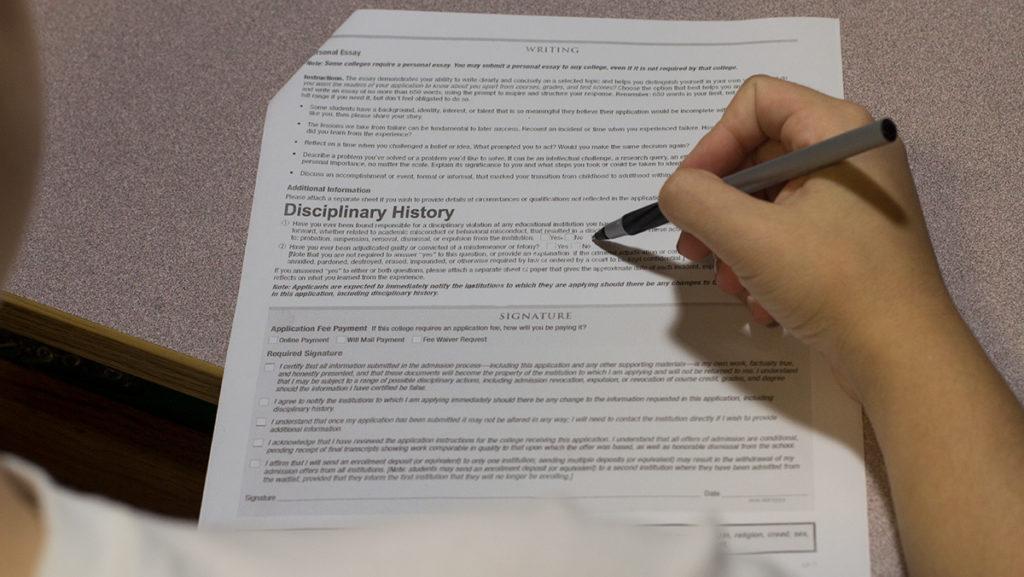Beginning with the 2018–19 academic year, state universities in New York will omit the question on their general college application that asks potential students if they have any previous criminal convictions. Though SUNY schools are making the change, Ithaca College is not.
SUNY schools decided to change the policy because many applicants who had to check the box did not finish the application. The decision ties into a national movement called Ban the Box, a campaign that advocates for the removal of the question to provide an equal opportunity for former felons to apply to college.
A report conducted by the Center for Community Alternatives shows that out of the 30 of the 60 SUNY schools that participated in the study, 1,462 of 310,925 applicants answered that they had been convicted of a felony. Of these 1,462 applicants who checked yes, 914 of them — 62.5 percent — did not complete the application. This data prompted the colleges to remove the question because they did not want to lose potential students.
Since the college uses the Common Application, it is required to use all the questions provided, said Nicole Eversley Bradwell, director of admissions. She said that as long as the question of past felony conviction is required by the Common Application, the college will require it.
It is not likely the college will go away from the Common Application because there are many benefits for students when applying to colleges to use that application, Bradwell said. By using the Common Application, students are able to apply to multiple schools at once while saving time and keeping the applicant’s information in a central location.
“We are not likely — because of one question — to create our own application,” she said.
However, the Common Application organization reviews its application annually and the college that use it are allowed to advocate and challenge different aspects of it, Bradwell said. She said it is hard for the Common Application — an application used nationally — to get rid of this specific question because some states require that information be collected. Since it is a general application that covers basic information for hundreds of colleges, if a question is asked by one school on the application, all schools must ask it.
The college has not made a formal request for the removal of the question because, Bradwell said, admissions does not only take into account whether a student has committed a felony when deciding who to admit.
“I’m not checking where they were convicted to ascertain exactly what the felony was,” Bradwell said.
Emily NaPier ’02, director of justice strategies at the Center for Community Alternatives and co-author of the SUNY schools report, said the Common Application is getting pressure to provide evidence showing that this question is right to ask.
Keri Blakinger, a reporter for the Houston Chronicle, was arrested for drug use while she was a student at Cornell University but went on to complete her degree at the university after the felony conviction. She said removing the question from applications makes people more likely to actually finish their application because the paperwork that is required once they check the box is very difficult for them to obtain.
“I think people feel that the more they are asked for additional material, the more they feel like they aren’t seriously being considered,” Blakinger said.
Manuel La Fontaine, the program manager for Legal Services for Prisoners with Children (LSPC), said the recent decision by SUNY schools to get rid of the question is a step in the right direction, but he said he recognizes there is still more that needs to be done to help formerly incarcerated people have equal opportunities.
“People need to know that this ‘Ban the Box’… is not the end goal,” La Fontaine said. “We are trying to create a culture where formerly incarcerated people are seen as people.”
The United States Department of Education released a “Beyond the Box” resource guide in May suggesting that colleges should use a holistic review of applicants and not place an emphasis on criminal history.
“We are really hopeful because of the national attention from the Obama administration coupled with the SUNY decision — that momentum is going to propel other schools across the country to follow SUNY’s example,” NaPier said.
Freshman Brina Edmonds-Reed suggested the severity of the felony should determine whether an applicant has to check the box.
“Everyone deserves that second chance not to be judged based on maybe one mistake that they made,” Edmonds-Reed said.
Sophomore Leslie Espinosa said she thinks that the college should consider getting rid of the question if the SUNY schools have a good reason for making that decision.
“Not everyone is a bad person necessarily because they committed a felony,” Espinosa said.
Though the college does not plan to change its policy, Bradwell said, that does not mean all colleges will react the same way.
“Each institution needs to figure out on their application and through their admission process what’s most important to them to ask for from students,” Bradwell said.
Correction: Previously the article stated that the common application question asks students about any previous felonies they have committed. The article was corrected to state that the question asks about any previous convictions.








